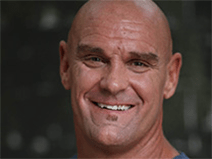Whether in the wrestling ring or as a horror film actor, Chris Hahn has always played the “bad guy.”
"The brain tumor was the best thing that ever happened to me because it humbled me. I was arrogant, but it put everything in perspective. I appreciate life more." — Chris
His physically demanding career caught up to him in 2014 when he faced a life-altering health scare.
“My job was to make the crowd hate and boo me,” Chris says. “I was a loud mouth.”
The Challenge: Head Injury Leads to Severe Symptoms
In the 90’s, Chris was a pro wrestler. His character’s name was Johnny Paradise. For 28 years, he was a commanding force in the ring at six foot, two inches tall, and 260 pounds.
Schedule an Appointment or Ask a Question
During a match in 2014, his opponent threw him from the ring and he hit his head on a steel railing.
A week later, he felt lightheaded and dizzy, and had severe migraines. Doctors prescribed migraine medicine and he pushed through the discomfort.
"Almost daily, I would wake up with the worst pain. I’d crawl out of bed, take my medicine, and go back to sleep."
When he started repeatedly blacking out, Chris’s mother grew concerned. She looked online and found a research study for traumatic brain injuries at the University of Pittsburgh.
The Path to UPMC: A Shocking Discovery
Chris traveled to Pittsburgh from his hometown in Mansfield, Ohio. He had tests of his vision, sleep, and balance as part of the study.
Thinking prior head injuries were causing his symptoms, his MRI results shocked both Chris and the medical staff. The real cause was a fist-sized brain tumor above his right eye.
David Okonkwo, MD, PhD, clinical director of the UPMC neurotrauma program and lead investigator of the study, explained to Chris that the tumor was most likely benign but growing at a fast pace. Chris’s symptoms would get worse unless they removed it.
“My whole life I had the outlook that nothing was going to hurt me, that I was a modern-day Superman. But with this brain tumor, there was nothing physically I could do about it. Imagine a 260-pound wrestler crying like a baby. I was scared,” Chris says.
The Solution: Expert Neurosurgeons Remove the Tumor
Chris had personality changes, memory problems, and trouble thinking and concentrating. The tumor involved the frontal lobe, or front part of the brain, which controls all these functions.
His brain had dramatic swelling as a reaction to the tumor, which was also greatly affecting function.
Three days after learning he had a tumor, Chris had surgery to remove it. Paul Gardner, MD, a UPMC neurosurgeon and director of the UPMC Center for Skull Base Surgery, performed the procedure. Dr. Okonkwo assisted.
Mindful of Chris’s acting career, the surgeons made the incision through one of his deep forehead creases to limit scars. For Chris, this was an ideal and less invasive approach.
Doctors removed the entire tumor, which turned out to be a benign meningioma. The swelling in his brain quickly improved.
The Results: A New Perspective on Life
A month after surgery, Chris was back in the gym, slowly building up his strength. He hasn’t had a migraine since his surgery and his scars are barely visible.
“UPMC is like my second family. Dr. Okonkwo and Dr. Gardner are top notch. They saved my life. I live close to another hospital in Ohio, but if I ever need to go anywhere, I’ll go to UPMC,” Chris says.
Chris retired from wrestling, but still works as a stuntman, actor, motivational speaker, and personal trainer. He avoids stunts that impact his head.
The experience has transformed his life.
“The brain tumor was the best thing that ever happened to me because it humbled me. I was arrogant, but it put everything in perspective. I appreciate life more,” says Chris.
Our patient stories profile a number of patients who have had minimally invasive brain surgery at UPMC. Although everyone's care experience is unique, we hope that sharing these stories will help other prospective patients and their families better understand these procedures and their potential benefits.
Chris’s treatment and results may not be representative of all similar cases.
















